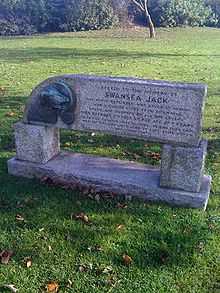Swansea Jack
| Swansea Jack | |
|---|---|
|
Swansea Jack memorial | |
| Species | Dog |
| Breed | Retriever, locally called a "Newfoundland dog" (see text) |
| Sex | Male |
| Born |
Jack 1930 Possibly Newfoundland, Canada (see text) |
| Died |
October 1937(Aged 7) Swansea, Wales |
| Resting place |
St. Helen's Rugby Grounds 51° 38' 0" North, 3° 58' 0" West |
| Nation from | Wales |
| Occupation | Lifeguard |
| Years active | 1931-1937 |
| Employer | North Dock |
| Known for | Rescuing 27 people |
| Title | Named "Dog of the Century" by National Canine Defence League; more (see text) |
| Owner | William Thomas |
| Appearance | Black retriever-type, longish hair, similar to a Flat-Coated Retriever |
| Lord Mayor of London: Silver Cup; National Canine Defence League: bronze medal (twice); Publically funded burial monument: Marble and Bronze; more (see text). | |
Swansea Jack (1930 - October 1937) was a famous dog that rescued 27 people from the docks and riverbanks of Swansea, Wales.[1]
Life
Swansea Jack was a black retriever with a longish coat. He was similar in appearance to a modern Flat-Coated Retriever,[2] but was instead identified at the time as a Newfoundland dog, despite being considerably smaller and lighter in build than the typical modern Newfoundland dog, possibly because he was reported to have been born in Newfoundland.[3] He lived in the North Dock / River Tawe area of Swansea with his master, William Thomas. Jack would always respond to cries for help from the water, diving into the water and pulling whoever was in difficulty to safety at the dockside.
His first rescue, in June 1931, when he saved a 12-year-old boy, went unreported. A few weeks later, this time in front of a crowd, Jack rescued a swimmer from the docks. His photograph appeared in the local paper and the local council awarded him a silver collar. In 1936, he had the prestigious 'Bravest Dog of the Year' award bestowed upon him by the London Star newspaper.
He received a silver cup from the Lord Mayor of London and he is still the only dog to have been awarded two bronze medals ('the canine V.C.') by the National Canine Defence League (now known as Dogs Trust). Legend has it that in his lifetime he saved 27 people from the Docks / River Tawe. Swansea Jack died in October 1937 after eating rat poison. His burial monument, paid for by public subscription, is located on the Promenade in Swansea near St. Helen's Rugby Ground. In 2000, Swansea Jack was named 'Dog of the Century' by NewFound Friends of Bristol who train domestic dogs in aquatic rescue techniques.
Legacy
A noted pub in Swansea is named Swansea Jack, in honour of the dog. A popular nickname for natives of Swansea is "Swansea Jack", and many people believe that this name also stems from the famous dog. Others claim that the derivation is from the nickname given to Swansea's sailors, who had a reputation as skilled and dependable mariners. Another theory is that the coal miners of nearby coalfields called the miners from Swansea "Jacks" because their lunch-boxes were uniquely made of Swansea tin and called Jacks.
References
- ↑ Famous Dog: Swansea Jack
- ↑ http://www.swanseacity.net/javaImages/82/d1/0,,10354~3330434,00.jpg
- ↑ "10 Most Fascinating Dogs". Eamazings.com. 2009-10-30. Retrieved 2011-06-17.
Further reading
- Treboeth history group (2012). "Swansea Jack". Sam Pritchard.
